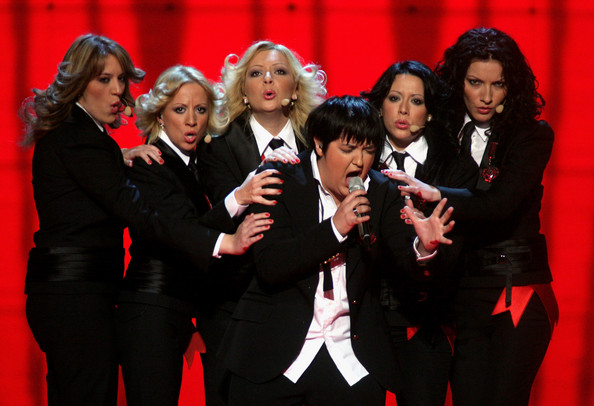Of the past twenty winners of Eurovision, 17 have sung in English. That suggests that English provides a clear advantage in what is meant to be a pan-European singing contest. But times change. London has restaurants with edible food. Germany is finally being asked to take over countries (well, financially at least). And a country called Azerbaijan had the opportunity to host Eurovision this year. Is it possible that the English-language advantage is disappearing too?
Let’s look at this year’s final results:
- The top 3 acts – 66% are not in English.
- The top 10 acts – 50% are not in English.
- All 26 acts – 38% are not in English.
What about the semi-finals – is that biased against non-English songs?
- Semi-final 1 – 28% of the acts sung in another language. 30% of the non-English songs went to the final.
- Semi-final 2 – 44% of the acts sung in another language. 40% of the non-English songs went to the final. (Although there was a tie for 10th place so 1 more vote for Bulgaria and it would have been 50% to the final).
So for the semi-finals the song’s language has no measurable impact. For the final there actually is a statistical bias. But it is against English and in favor of songs in their native language. I think this makes sense because Eurovision rewards acts that are a bit different. People want something they like, but that does not sound like the music they listen to every day. A song in another language helps provide that difference, in a good way. It also helps that people are not as parochial as they used to be.
Marija Serifovic won Eurovision 2007. She sang in Serbian.
Was 2012 an aberration or has this been going on for a while?
- 2011 – there were only 4 finalists not in English which is a very small sample set. But of those, one placed second and two finished right in the middle, so they had a pretty even distribution. So language had no impact.
- 2010 – 24% were not in English. The best finished in 8th place, but 33% placed in the top 15 (yes I’m cherry picking). So English was an advantage.
- 2009 – 36% not in English. 20% made the top 10 (barely). English was a major advantage.
- 2008 – 40% not in English. 0 in the top 3 and 40% in the top 10 (starting at 6th). So English was needed to get to the very top.
- 2007 – 42% not in English. Entries 1 & 2 not in English. 30% of the top 10. Non-English was a major advantage.
Part of the problem with the above numbers is the total number of acts is small (24 – 26). And the quality of the performance has a gigantic impact. But looking at the above it is fair to say that the language of the song does not have a significant impact.
I think we’ll see more and more countries sing in their native language as they see the success of entries like the ones this year from the Annoying Babushki to the Scream-a-thon diva from Albania. (Or for those of us with good taste, the entries from Serbia, Estonia, and Spain.)
It’s a big change from 20 years ago.











Just to add – in 2011, out of the 4 non-english songs, 3 of them were part of the Big Five. There was only one non-English qualifier – Serbia’s Nina with Caroban.
@David Thielen: OK, I looked at the top 3 in 2007 & 2012. Top 3 in 2007: Serbia singing in Serbian (Serbia is one of the “old” Eurovision countries – they won the contest in the 80s singing in Serbian, plus there is a strong bloc voting between the former Yugoslavian countries); Ukraine singing in Ukrainian, Russian, English, German -so trying to appeal to everybody including former Soviet countries that vote between themselves anyway, Russia that sang in English. Top 3 in 2012: Sweden singing in English, Russia that definitively did not place 2nd because of the language and Serbia… Read more »
@MF >>although this was like 40 years ago, not a lot has changed on perception.
I disagree, I think over 40 years this has changed. Look at the top 3 in 2007 & 2012. That’s not an anomaly, that’s a trend.
“Or for those of us with good taste, the entries from Serbia, Estonia, and Spain” 🙂 So, you have good taste! I have mixed feelings about what language is best to use at Eurovision. I’m not convinced own language is better than English even if it seems to work for former Yugoslavian countries (but Yugoslavia used to participate in Eurovision before many other countries) . It’s also a matter of preference: I personally prefer Latin languages over all the other ones. Plus there are 2 languages that I really don’t like – I won’t mention them here as it would… Read more »